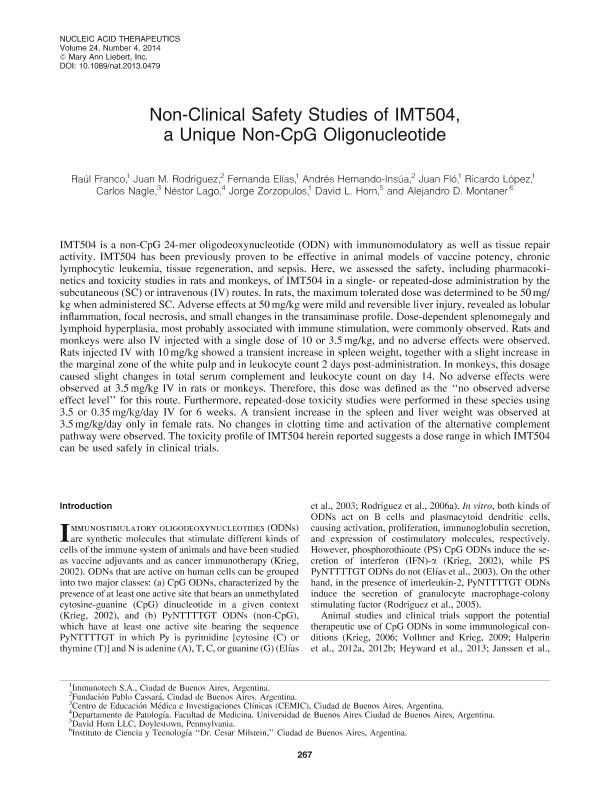Mostrar el registro sencillo del ítem
dc.contributor.author
Franco, Raul
dc.contributor.author
Rodriguez, Juan Manuel

dc.contributor.author
Elias, Fernanda

dc.contributor.author
Hernando Insúa, Andrés
dc.contributor.author
Fló, Juan
dc.contributor.author
López, Ricardo
dc.contributor.author
Nagle, Carlos Alberto

dc.contributor.author
Lago, Néstor Rubén

dc.contributor.author
Zorzopulos, Jorge

dc.contributor.author
Horn, David
dc.contributor.author
Montaner, Alejandro Daniel

dc.date.available
2020-04-06T19:43:03Z
dc.date.issued
2014-05
dc.identifier.citation
Franco, Raul; Rodriguez, Juan Manuel; Elias, Fernanda; Hernando Insúa, Andrés; Fló, Juan; et al.; Non-clinical safety studies of IMT504, a unique non-CpG oligonucleotide; Oxford University Press; Nucleic Acids Research; 24; 4; 5-2014; 267-282
dc.identifier.issn
0305-1048
dc.identifier.uri
http://hdl.handle.net/11336/102075
dc.description.abstract
El IMTE 504 es un oligonucleotido de la linea no CgG, el cual estimula diferentes celulas del sistema inmune. El IMT 504 ha sido testeado en diferentes especies animales: raton, conejo, monos y su actividad fue efectiva en vacunas, leucemia cronico, diabetes, repareacion de tejidos y sepsis . Por lo tanto es de interes evaluar la toxicidad de este oligonucleotido.
dc.description.abstract
IMT504 is a non-CpG 24-mer oligodeoxynucleotide (ODN) with immunomodulatory as well as tissue repair activity. IMT504 has been previously proven to be effective in animal models of vaccine potency, chronic lymphocytic leukemia, tissue regeneration, and sepsis. Here, we assessed the safety, including pharmacokinetics and toxicity studies in rats and monkeys, of IMT504 in a single- or repeated-dose administration by the subcutaneous (SC) or intravenous (IV) routes. In rats, the maximum tolerated dose was determined to be 50 mg/ kg when administered SC. Adverse effects at 50 mg/kg were mild and reversible liver injury, revealed as lobular inflammation, focal necrosis, and small changes in the transaminase profile. Dose-dependent splenomegaly and lymphoid hyperplasia, most probably associated with immune stimulation, were commonly observed. Rats and monkeys were also IV injected with a single dose of 10 or 3.5 mg/kg, and no adverse effects were observed. Rats injected IV with 10 mg/kg showed a transient increase in spleen weight, together with a slight increase in the marginal zone of the white pulp and in leukocyte count 2 days post-administration. In monkeys, this dosage caused slight changes in total serum complement and leukocyte count on day 14. No adverse effects were observed at 3.5 mg/kg IV in rats or monkeys. Therefore, this dose was defined as the ‘‘no observed adverse effect level’’ for this route. Furthermore, repeated-dose toxicity studies were performed in these species using 3.5 or 0.35 mg/kg/day IV for 6 weeks. A transient increase in the spleen and liver weight was observed at 3.5 mg/kg/day only in female rats. No changes in clotting time and activation of the alternative complement pathway were observed. The toxicity profile of IMT504 herein reported suggests a dose range in which IMT504 can be used safely in clinical trials.
dc.format
application/pdf
dc.language.iso
eng
dc.publisher
Oxford University Press

dc.rights
info:eu-repo/semantics/openAccess
dc.rights.uri
https://creativecommons.org/licenses/by-nc/2.5/ar/
dc.subject
IMT504
dc.subject
NON-CPG OLIGONUCLOTIDES
dc.subject
ADJUVANT
dc.subject
NON CLINICAL SAFETY STUDIES
dc.subject.classification
Otras Ciencias de la Salud

dc.subject.classification
Ciencias de la Salud

dc.subject.classification
CIENCIAS MÉDICAS Y DE LA SALUD

dc.title
Non-clinical safety studies of IMT504, a unique non-CpG oligonucleotide
dc.type
info:eu-repo/semantics/article
dc.type
info:ar-repo/semantics/artículo
dc.type
info:eu-repo/semantics/publishedVersion
dc.date.updated
2020-04-02T15:02:00Z
dc.identifier.eissn
1362-4962
dc.journal.volume
24
dc.journal.number
4
dc.journal.pagination
267-282
dc.journal.pais
Reino Unido

dc.journal.ciudad
Oxford
dc.description.fil
Fil: Franco, Raul. Immunotech S.a.; Argentina
dc.description.fil
Fil: Rodriguez, Juan Manuel. Fundación Pablo Cassara; Argentina
dc.description.fil
Fil: Elias, Fernanda. Immunotech S.a.; Argentina
dc.description.fil
Fil: Hernando Insúa, Andrés. Fundación Pablo Cassara; Argentina
dc.description.fil
Fil: Fló, Juan. Immunotech S.a.; Argentina
dc.description.fil
Fil: López, Ricardo. Immunotech S.a.; Argentina
dc.description.fil
Fil: Nagle, Carlos Alberto. Centro de Educaciones Médicas e Investigación Clínica "Norberto Quirno"; Argentina
dc.description.fil
Fil: Lago, Néstor Rubén. Universidad de Buenos Aires. Facultad de Medicina. Departamento de Patología; Argentina
dc.description.fil
Fil: Zorzopulos, Jorge. Immunotech S.a.; Argentina
dc.description.fil
Fil: Horn, David. David Horn LlC; Estados Unidos
dc.description.fil
Fil: Montaner, Alejandro Daniel. Consejo Nacional de Investigaciones Científicas y Técnicas. Oficina de Coordinación Administrativa Parque Centenario. Instituto de Ciencia y Tecnología "Dr. César Milstein". Fundación Pablo Cassará. Instituto de Ciencia y Tecnología "Dr. César Milstein"; Argentina
dc.journal.title
Nucleic Acids Research

dc.relation.alternativeid
info:eu-repo/semantics/altIdentifier/url/http://www.ncbi.nlm.nih.gov/pmc/articles/PMC4106379/
dc.relation.alternativeid
info:eu-repo/semantics/altIdentifier/doi/http://dx.doi.org/10.1089/nat.2013.0479
Archivos asociados
